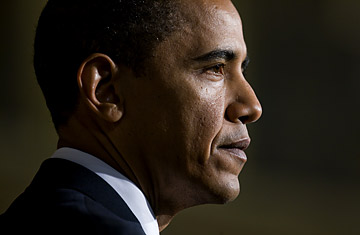
President Barack Obama
(4 of 6)
I went back and read your announcement speech again, and it struck me that even then — you brought up health care maybe three or four times, but you even then were framing it in — as a cost-containment issue, not just a coverage. In fact, you seem to be putting more emphasis on cost containment.
In fact, you seem to be putting more emphasis on cost-containment. So that's been really consistent with your approach to this issue since 2007.
But some things have changed. I mean, for instance you were very much against an individual mandate. Could you describe how your thinking has evolved on this issue as you've sort of gotten — and also at the time you defined success as universal coverage by the end of your first term.
I feel pretty good that I've been pretty consistent on this. The individual mandate is probably the one area where I basically changed my mind. The more deeply I got into the issue, the more I felt that the dangers of adverse selection justified us creating a system that shares responsibility, as long as we were actually making health insurance affordable and there was a hardship waiver for those who, even with generous subsidies, couldn't afford it. And that remains my position.
I think other than that we've been pretty consistent about how I think we need to approach the problem. And by the way, I in no way want to suggest that cost is more important than coverage. My point has been that those two things go hand in hand. If we can't control costs, then we simply can't afford to expand coverage the way we need to. In turn, if we can expand coverage, that actually gives us some leverage with insurers or pharmaceutical industry or others to do more to help make the health care system more cost-effective.
That's your carrot.
Yes.
What about — you mentioned that subsidies have to be there. What's — you're hearing now — 300% [that the government would provide assistance to people earning up to 300% of poverty]. Is that enough? Is that really —
Until I actually see the numbers, I don't want to give a definitive answer on that. I do think that if we can figure out what is a fair, appropriate percentage of your income that you're paying on health care, and peg it — peg subsidies so that it's meeting that test, potentially with some regional variation then we'll get it right. And I think that the committees are working on that. That's the kind of detail that we had anticipated working through in conference. If it turns out that Congress just can't get there and that's the holdup, then we'll give a very definitive idea of where we need to go on it.
Can I ask you, if you go to the polling, which I'm sure you never do, but if you ever did —
No, actually, on this — I will confess: I don't spend a lot of time looking at my polls. I do look at the polling on health care, partly because I think that there is a terrific case to be made to the American public. But it is — this is complicated, it's difficult. Without giving you a hard time, Karen, because I think you've been terrific in reporting this, the press gets bored with the details easily, and it very easily slips into a very conventional debate about government-run health care versus the free market, et cetera, which is not at all what the real debate is about, but that's a lot of times how it gets shaded or framed in the press — all of which feeds the public spheres, even though they know that the system we have isn't working very well.
And I will say that this has been the most difficult test for me so far in public life, trying to describe in clear, simple terms how important it is that we reform this system. The case is so clear to me. And when I sit with our policy advisors — we had somebody here sitting right there this morning who is a medical expert, worked at McKinsey for a while, he's now working on our health care team — and he just ran through: We pay 77 percent more on prescription drugs, we're paying $6,000 more per individual on health care than any other industrialized nation; here's all the failures in the delivery system that account for it. It's not just because we are somehow more obese or more unhealthy. It turns out actually we're a little bit healthier than most of these other countries because our smoking rates are lower and we're younger. So we should actually be paying less than they are.
And when you just start hearing the litany of facts, what you say to yourself is this shouldn't be such a hard case to make, because the American consumer is really not getting a good deal.
And so when I see polls saying that it's 50-50 and people are still worried about whether this is going to somehow increase their costs when every bill that's out there would lower them, or that this is going to mean that they lose their doctors, or their health care is rationed, or, you know, all the other things that they're worried about, it leads me to spend a lot of time thinking about how can I describe this in clearer terms so that we can get the health care that the American people deserve.
